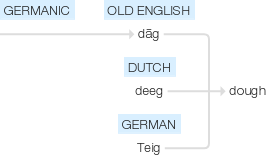Dough
Old English dāg, of Germanic origin; related to Dutch deeg and German Teig, from an Indo-European root meaning ‘smear, knead’.
wiktionary
From Middle English dow, dogh, dagh, from Old English dāg, from Proto-Germanic *daigaz(“dough”), from Proto-Indo-European *dʰeyǵʰ-(“to knead, form, mold”). Cognate with Scots daich, dauch, doach(“dough”), West Frisian daai(“dough”), Dutch deeg(“dough”), Low German Deeg(“dough”), German Teig(“dough”), Norwegian Bokmål deig(“dough”), Danish dej(“dough”), Swedish deg(“dough”), Icelandic deig(“dough”).
The derivation of the second meaning (of money) is obscure, but dates to the mid 19th century.
etymonline
dough (n.)
"mass of flour or meal moistened and mixed for baking," Middle English dogh, from Old English dag "dough," from Proto-Germanic *daigaz "something kneaded" (source also of Old Norse deig, Swedish deg, Middle Dutch deech, Dutch deeg, Old High German teic, German Teig, Gothic daigs "dough"), from PIE root *dheigh- "to form, build." Meaning "money" is from 1851 (compare bread (n.)).
